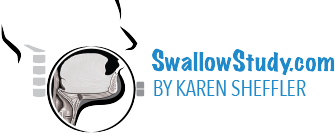Medical Blog Writing
Medical Blog Writing
Medical Speech-Language Pathology and Dysphagia
Stay up–to–date in your evidence-based practice in the field of swallowing and swallowing disorders (dysphagia). Read, comment, and ask questions on my latest collection of blogs summarizing the latest research and hot topics.
Some of our latest blog posts
USIRG at ASHA2023
The United States IDDSI Reference Group (USIRG) presented at ASHA in November, 2023 in Boston to provide solutions to overcome any barriers to IDDSI implementation. Please always refer to our chart of resources: https://iddsi.org/United-States We update that often....
Bread of Life? Evidence on Choking Risks with Bread
Bread of Life? Evidence on Choking Risks with Bread by Karen Sheffler, MS, CCC-SLP, BCS-S of SwallowStudy.com in collaboration with Dr. Catriona M. Steele, PhD, CCC-SLP, ASHA Fellow, Dr. Julie Cichero, BA, BSpThy (Hons), PhD, and Laura Brooks, MS, CCC-SLP, BCS-S (on...
Dysphagia Protocol for People Post-Lung Transplant
Path to a Dysphagia Protocol for People Post-Lung Transplant by Sarah Russell, MS, CCC-SLP, BCS-S Editor & Co-author: Karen Sheffler, MS, CCC-SLP, BCS-S of SwallowStudy.com Introduction It was early 2020. (Remember that time just before COVID-19 hit?) I sat in...
Evidence-based articles about dysphagia to help people with dysphagia, promote patient safety, and provide content marketing for products.
Web-ready to share on social media!
Commissioned Work
The Proof is in the Pudding: A Tribute to Dr. Steven Leder & His Contributions to FEES
This article explored the now 30-year history of FEES, with a special focus on Dr. Leder’s work from 1997 to 2016 (references are listed chronologically to reflect history). Karen reviewed Dr. Leder’s early contributions, research regarding the benefits of FEES, some of his work with specific populations, and finally other exam considerations (i.e., the use of dyes and the need for a residue rating scale).









